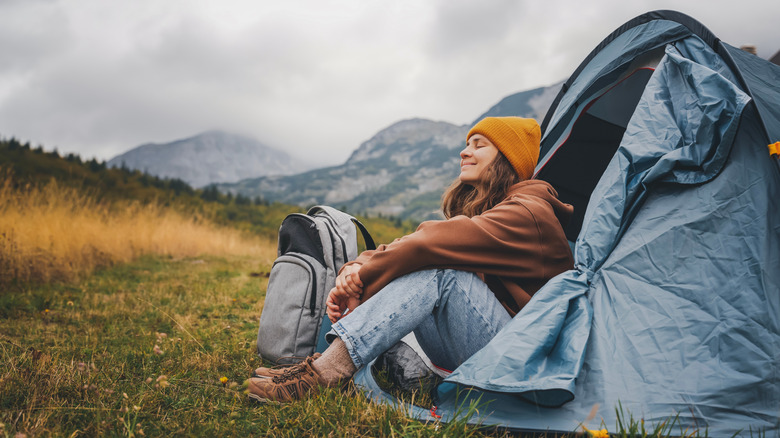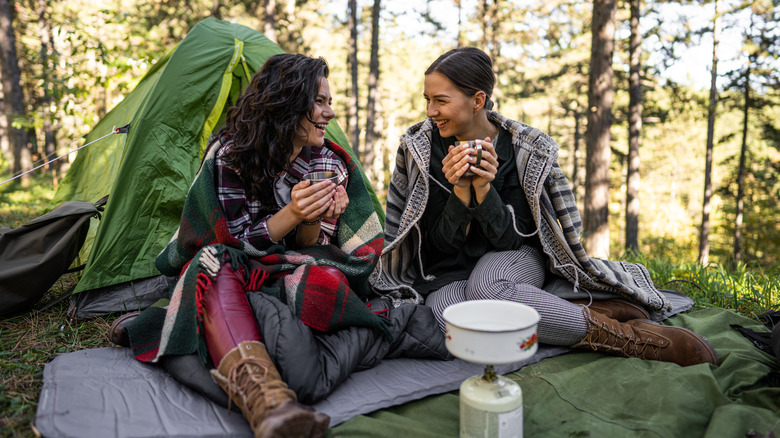The Awesome Reason 'Record Numbers' Of Women Are Solo Camping
A lot has changed in the world of travel since the pandemic stopped us in our tracks. People are traveling more, eager to see the world that was perhaps once taken for granted. With a rise in visitor numbers to every corner of the globe, one area of travel where numbers are growing considerably is female solo travel, with an estimated 85% of solo travelers being women. Travel companies have taken notice, and businesses catering specifically to female travelers and women-only groups have increased by 230%. While the majority of women prioritize cultural and historic sites when traveling solo, being in nature is also high on the list, and what better way to spend time in the great outdoors than solo travel and mastering camping on your own?
According to Winnebago Industries, 52% of women plan to spend more time outside in 2025 and are recognizing the wide-ranging benefits it brings. The motivations are personal and all about health and well-being: reducing stress, improving mood, the physical boost from doing more exercise, and confidence-building. A record number of women, both single and with partners, are also choosing solo camping for the independence and freedom it given them to make their own itinerary decisions. This is especially true for women over 40 who have often prioritized family and are now turning to this popular travel trend that empowers women to be adventurous and explore the world.
The benefits and barriers of women solo camping
While female solo campers may feel more vulnerable than men, that shouldn't be a barrier, and the range of physical and emotional rewards far outweigh the challenges. Going camping, or simply being outside in nature, is a great mood booster. There's nothing like a breath of fresh air to make you feel better, ease stress levels, and improve sleep — sleeping outdoors has even been shown to reset natural sleep rhythms. Plus, camping encourages you to move more, whether it's putting up a tent or exploring nearby trails. It's also a reminder that 'solo' doesn't necessarily mean 'alone'; it can be an opportunity to join a community of like-minded women campers, where experiences, support, and laughter can be shared as a group.
Traveling alone often pushes you outside your comfort zone, creating a strong sense of accomplishment and growing confidence in your abilities — especially when camping out in nature — and with that comes empowerment and the realization that far more is possible than you may have imagined. Solo travel also brings independence and the freedom to go where you want and when you want. But, priorities differ across age groups. Older women often value independence and self-discovery, while Gen Z and millennials cite skill-building and gaining new perspectives as their objectives. Of course, there are obstacles, with common concerns such as safety or the fear of being alone. But with the rise of support networks, online communities, and encouragement from organizations like GirlCamper, the benefits of solo camping far outweigh the challenges.
Preparation tips for solo women campers
Once you've taken that first step and decided that solo camping is for you, what's next? As with any type of travel, preparation is key. Practical outdoor skills, such as choosing the right campsite, preparing and storing food, and having the right gear, are worth studying up on before you pitch your tent or hitch your trailer. You can learn these skills by taking courses or joining outdoor groups, both will help boost your confidence before you set off into nature. Preparation isn't limited to practical skills, it's important to be emotionally ready, too. While the thought of being alone may be music to your ears, it's normal to feel apprehensive. Acknowledging and overcoming fear is another step to finding your inner strength as a solo camper.
There's no such thing as too much planning, and there's a lot to think about, such as where to go, what type of camping to do, how long you'll be away, whether you want to be completely alone or part of a group, and whether reservations are needed. It's often best to start small and try an overnight or weekend trip to see if solo camping is for you. Once you're out in the wild, always let someone know where you'll be and trust your intuition. Take simple precautions like carrying a first aid kit, downloading maps, or avoiding campsites that feel too isolated. It's easier than ever to stay connected with satellite internet and GPS location-sharing, and with the right preparation, camping solo could be the most fun and empowering experience you'll ever have.


